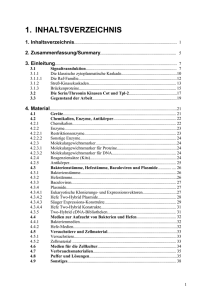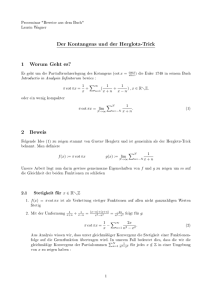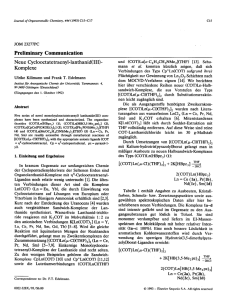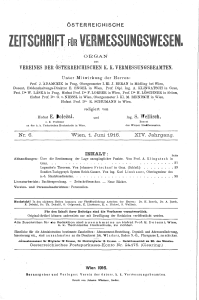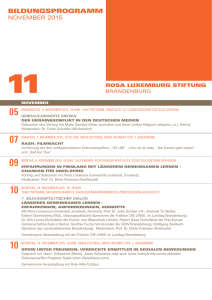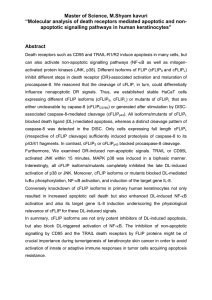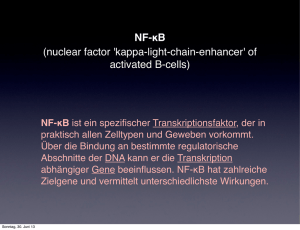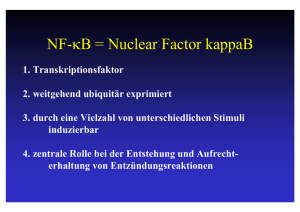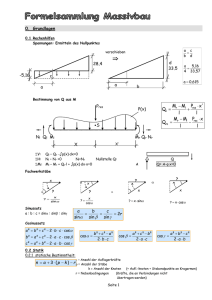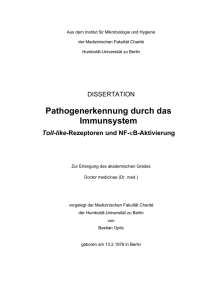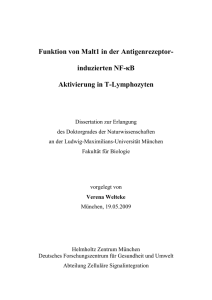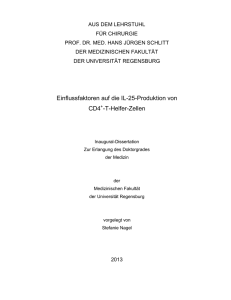Dokument_2.
Werbung
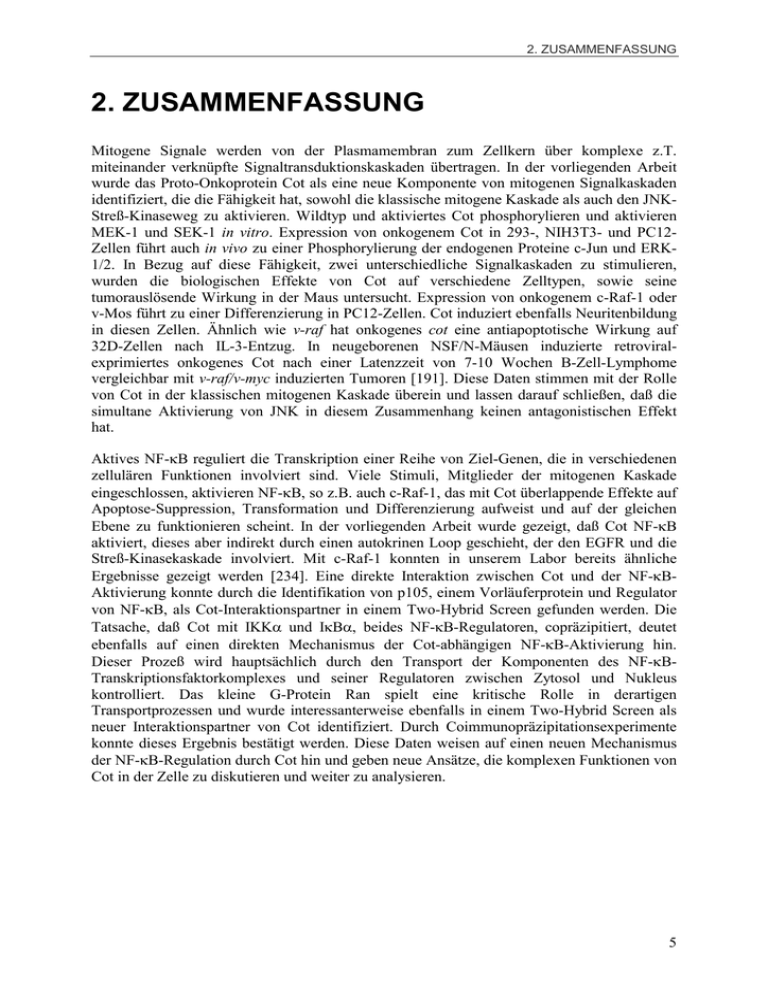
2. ZUSAMMENFASSUNG 2. ZUSAMMENFASSUNG Mitogene Signale werden von der Plasmamembran zum Zellkern über komplexe z.T. miteinander verknüpfte Signaltransduktionskaskaden übertragen. In der vorliegenden Arbeit wurde das Proto-Onkoprotein Cot als eine neue Komponente von mitogenen Signalkaskaden identifiziert, die die Fähigkeit hat, sowohl die klassische mitogene Kaskade als auch den JNKStreß-Kinaseweg zu aktivieren. Wildtyp und aktiviertes Cot phosphorylieren und aktivieren MEK-1 und SEK-1 in vitro. Expression von onkogenem Cot in 293-, NIH3T3- und PC12Zellen führt auch in vivo zu einer Phosphorylierung der endogenen Proteine c-Jun und ERK1/2. In Bezug auf diese Fähigkeit, zwei unterschiedliche Signalkaskaden zu stimulieren, wurden die biologischen Effekte von Cot auf verschiedene Zelltypen, sowie seine tumorauslösende Wirkung in der Maus untersucht. Expression von onkogenem c-Raf-1 oder v-Mos führt zu einer Differenzierung in PC12-Zellen. Cot induziert ebenfalls Neuritenbildung in diesen Zellen. Ähnlich wie v-raf hat onkogenes cot eine antiapoptotische Wirkung auf 32D-Zellen nach IL-3-Entzug. In neugeborenen NSF/N-Mäusen induzierte retroviralexprimiertes onkogenes Cot nach einer Latenzzeit von 7-10 Wochen B-Zell-Lymphome vergleichbar mit v-raf/v-myc induzierten Tumoren [191]. Diese Daten stimmen mit der Rolle von Cot in der klassischen mitogenen Kaskade überein und lassen darauf schließen, daß die simultane Aktivierung von JNK in diesem Zusammenhang keinen antagonistischen Effekt hat. Aktives NF-κB reguliert die Transkription einer Reihe von Ziel-Genen, die in verschiedenen zellulären Funktionen involviert sind. Viele Stimuli, Mitglieder der mitogenen Kaskade eingeschlossen, aktivieren NF-κB, so z.B. auch c-Raf-1, das mit Cot überlappende Effekte auf Apoptose-Suppression, Transformation und Differenzierung aufweist und auf der gleichen Ebene zu funktionieren scheint. In der vorliegenden Arbeit wurde gezeigt, daß Cot NF-κB aktiviert, dieses aber indirekt durch einen autokrinen Loop geschieht, der den EGFR und die Streß-Kinasekaskade involviert. Mit c-Raf-1 konnten in unserem Labor bereits ähnliche Ergebnisse gezeigt werden [234]. Eine direkte Interaktion zwischen Cot und der NF-κBAktivierung konnte durch die Identifikation von p105, einem Vorläuferprotein und Regulator von NF-κB, als Cot-Interaktionspartner in einem Two-Hybrid Screen gefunden werden. Die Tatsache, daß Cot mit IKKα und IκBα, beides NF-κB-Regulatoren, copräzipitiert, deutet ebenfalls auf einen direkten Mechanismus der Cot-abhängigen NF-κB-Aktivierung hin. Dieser Prozeß wird hauptsächlich durch den Transport der Komponenten des NF-κBTranskriptionsfaktorkomplexes und seiner Regulatoren zwischen Zytosol und Nukleus kontrolliert. Das kleine G-Protein Ran spielt eine kritische Rolle in derartigen Transportprozessen und wurde interessanterweise ebenfalls in einem Two-Hybrid Screen als neuer Interaktionspartner von Cot identifiziert. Durch Coimmunopräzipitationsexperimente konnte dieses Ergebnis bestätigt werden. Diese Daten weisen auf einen neuen Mechanismus der NF-κB-Regulation durch Cot hin und geben neue Ansätze, die komplexen Funktionen von Cot in der Zelle zu diskutieren und weiter zu analysieren. 5 2. ZUSAMMENFASSUNG 2. SUMMARY Mitogenic signals initiated at the plasma membrane are transmitted to the nucleus through complex and partially connected signal transduction cascades. The proto oncoprotein Cot was identified in this thesis as a new component of mitogenic signalling cascades, which activates both, the classic cytoplasmic cascade and the JNK stress pathway. Wildtype and activated Cot phosphorylate and activate MEK-1 and SEK-1 in vitro. Moreover, expression of oncogenic Cot in 293, NIH3T3 and PC12 cells leads to phosphorylation of endogenous c-Jun and ERK 1/2 in vivo. To test the relevance of the ability of Cot to stimulate two different signalling cascades we have examined the effects of Cot on different cell types as well as on tumor induction in mice. Expression of oncogenic c-Raf-1 or v-Mos leads to differentiation of PC12 cells. Cot induces as well neurite outgrowth in these cells. Furthermore, oncogenic Cot shows similar to v-raf an antiapoptotic effect on 32D cells after IL-3 deprivation. Retrovirally expressed oncogenic Cot induces B-cell lymphomas in newborn NSF/N mice after a latency of 7-10 weeks similiar to v-raf/v-myc [191]. This data are consistent with the role of Cot in the classic mitogenic cascade and suggest that the simultaneously activated JNK stress pathway has no antagonistic effects in this context. Active NF-κB regulates transcription of a variety of target genes involved in distinct cellular functions. Many stimuli activate NF-κB including members of the mitogenic cascade, e.g. cRaf-1, which seems to function on the same level as oncogenic Cot and has partially overlapping effects on apoptosis suppression, transformation and differentiation. The work presented in this thesis demonstrates that Cot activates NF-κB and that this activation occurs indirectly via an autocrine loop which involves the EGF-receptor and also results in the activation of the stresskinase pathway. Similar results have been obtained in our lab in the past with Raf-1 [234]. An additional more direct pathway from Cot to NF-κB activation was demonstrated by our identification of p105, a precursor protein and regulator of NF-κB, as Cot interaction partner in a Two-hybrid screen. Furthermore, Cot coprecipitates with IKKα and IκBα, which are both regulators of NF-κB. The process of NF-κB activation is mainly controlled by the shuttling of components of the active transcription factor complex as well as of its regulators between cytosol and the nucleus. It is assumed that the small GTPase Ran plays a crucial role in these transports. Interestingly, we observed in a Twohybrid screen that Ran is interacting with Cot which also was confirmed by coimmunoprecipitation experiments. These results point to a new mechanism of NF-κB regulation by activated Cot and gives new starting points to analyse the complex functions of Cot in the cell. 6
